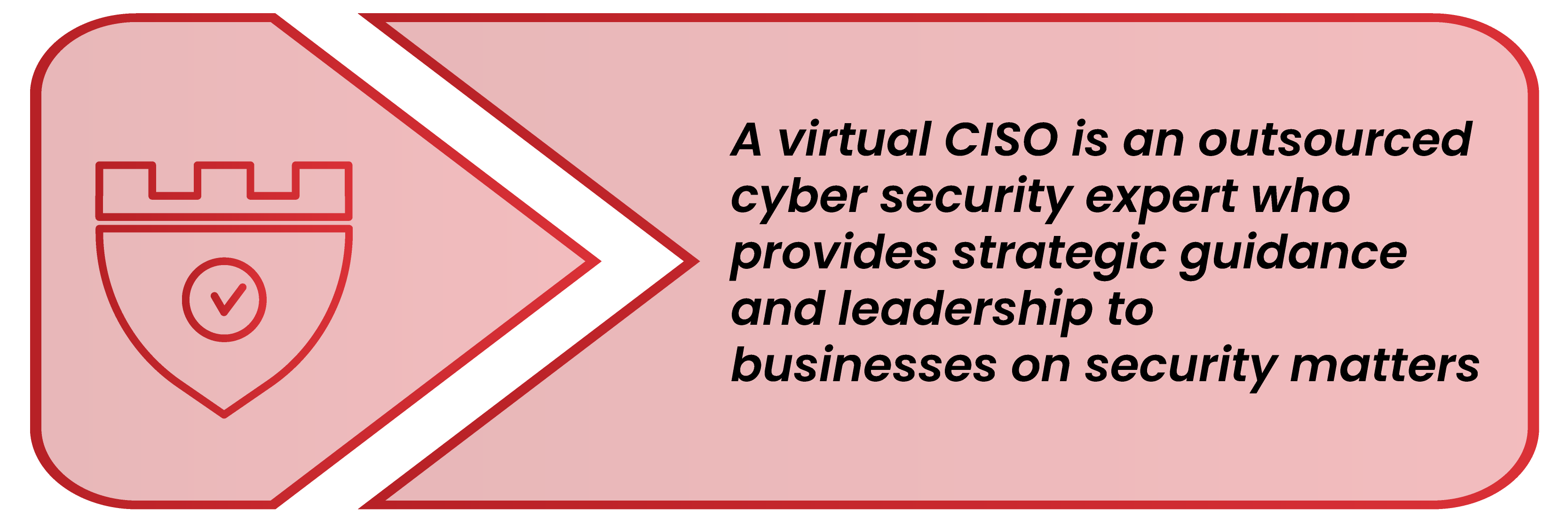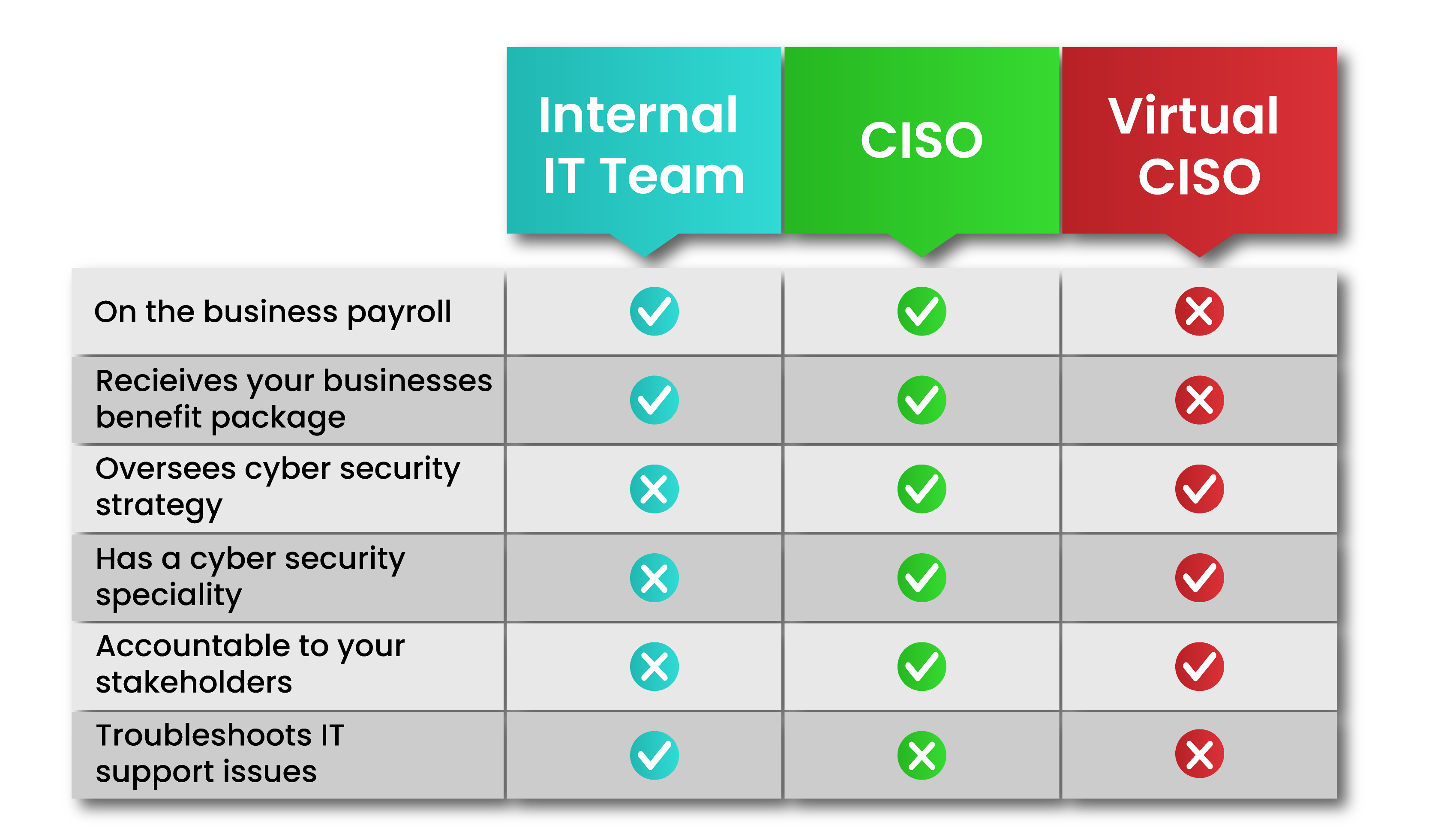What is a Virtual CISO and Does Your Business Really Need One?
June 28, 2024
Cyber security investment is essential for business success. For SMEs, especially those in financial services, protecting sensitive data is crucial. Many SMEs still don’t have a Chief Information Security Officer (CISO), virtual CISO, or a similar position. It may not be necessary or feasible to have a full-time, in-house CISO. That’s where the concept of a virtual CISO (vCISO) comes in.
A virtual Chief Information Security Officer (vCISO) can be invaluable. They provide essential protection against costly cyberattacks, protect finances, preserve reputation, and ensure business continuity. But what exactly is a vCISO? What role do they play? And most importantly, how can integrating one benefit your bottom line?
This article will explore the role of a vCISO, their responsibilities, how to determine if your business needs one, and how to get started with integrating one into your cyber security strategy.
A virtual CISO (vCISO) is a highly trained cyber security expert contracted by a business to oversee its IT security and compliance programmes on a remote or part-time basis. Drawing upon extensive experience from working across various organisations and industries, they bring a wealth of cyber security knowledge and strategic insight.

Unlike a full-time, in-house CISO, a vCISO can be engaged as needed, offering a flexible and cost-effective approach to managing cyber security risks. This role is particularly beneficial for SMEs that may lack the resources to hire a full-time CISO but still require the expertise and strategic vision of a seasoned security leader.
A virtual CISO performs a wide range of tasks designed to enhance and protect the business’s cyber security posture. Here are some of the key responsibilities of a virtual CISO:
They work closely with the business’s leadership team to create a comprehensive cyber security strategy that aligns with business goals and risk tolerance. This roadmap outlines the steps needed to enhance the business’s security posture over time.
Proactively identifying and analysing vulnerabilities in systems, networks, and data is a critical function of a virtual CISO. They use their expertise to pinpoint weaknesses that cybercriminals could exploit and recommend measures to mitigate these risks.
A virtual CISO uses established cyber security frameworks such as Cyber Essentials, ISO 27001, and others to ensure that the business follows best practices. These frameworks provide a structured approach to managing and reducing cyber security risks.
Developing and enforcing security policies and procedures is essential for reducing risk and ensuring compliance with industry standards and regulations. A virtual CISO creates these policies and implements them effectively across the business.
In the event of a cyber security breach, a virtual CISO oversees the response efforts, working to contain threats quickly and minimise damage. They ensure that the business has a robust incident response plan in place and that all employees are prepared to act swiftly.
Compliance with industry-specific regulations, such as PCI DSS and GDPR, is a significant concern for many businesses within the financial sector. A virtual CISO helps ensure that the organisation meets these requirements and assists in preparing for audits.
Third-party vendors and partners can introduce additional security risks. A virtual CISO assesses the security posture of these external entities to minimise supply chain risks and ensure they meet the organisation’s security standards.
A strong security culture within the organisation is crucial for preventing cyber incidents. A virtual CISO designs and implements security awareness programmes to educate employees about cyber security threats and best practices.
Regularly reporting on cyber security metrics, risks, and strategies to the board in clear business language is another critical responsibility of a virtual CISO. This ensures that the leadership is informed and can make data-driven decisions regarding the business’s security posture.
Your internal IT team handles day-to-day issues, such as connectivity problems and network support. In contrast, a virtual CISO is responsible for the big picture of your business’s technology and security. They design a comprehensive strategy, select the appropriate tools, and provide oversight on your overall cyber security posture.
While your IT team possesses broad technical knowledge for managing daily operations, a virtual CISO brings deep, specialised expertise in risk management and cyber security.

Here are five top benefits of having a virtual CISO service:
Hiring a full-time CISO can be expensive, especially for SMEs. Virtual CISOs offer a more cost-effective alternative, allowing businesses to access expert cyber security guidance without the overhead costs of a full-time employee.
A virtual CISO provides the flexibility to scale security resources in terms of time commitment and scalability. Organisations can engage their services on a part-time or as-needed basis, adjusting the level of support based on their growing needs.
Virtual CISOs bring extensive knowledge, skills, and experience to the table. They often have diverse backgrounds in cyber security and can offer valuable insights and best practices tailored to the organisation’s cyber security programme.
Virtual CISOs help ensure that your business adheres to industry regulations and standards. They provide guidance on governance, risk management, and compliance, helping to mitigate legal and regulatory risks. They can assist in preparing for and conducting regulatory audits and assessments, demonstrating your firm’s commitment to cyber security to investors and relevant regulatory authorities.
Virtual CISOs can be sourced from various locations, significantly expanding the available talent pool. This enables organisations to hire top cyber security professionals without being limited by geographical constraints. As a result, businesses can benefit from better cyber security strategies and outcomes by having access to a diverse range of expertise.
Determining whether your business would benefit from a virtual CISO or a full-time, in-house CISO can be challenging. Here are five reasons why choosing a virtual CISO could be highly advantageous for your business.
The rise in cyberattacks and stricter data privacy regulations have increased the demand for CISOs. However, hiring a full-time CISO can impose a significant financial burden. Here’s where a virtual CISO excels: they usually operate on a consumption-based model, allowing you to pay only for the services you require. Collaboratively, you and your virtual CISO can create a work schedule that aligns with your budgetary constraints.
Moreover, since the role is virtual, there’s no need to confine your search to local talent. This mitigates recruitment, onboarding, and relocation expenses—particularly beneficial for businesses in smaller or remote locations.
If your IT team is overstretched, struggling to keep up with the cyber threat landscape, or lacking specialised cyber security expertise, a virtual CISO can help. They provide the necessary leadership and support to strengthen your defences.
By engaging a virtual CISO, you empower your team with strategic direction, goal setting, and invaluable training and mentorship. Additionally, your virtual CISO can serve as the team’s liaison, ensuring alignment with executive management, boards, investors, and regulatory bodies.
Cyber security and data privacy regulations have intensified in recent years, with stringent standards such as the General Data Protection Regulation (GDPR) prompting global legislative adjustments. If you’re uncertain about your business’s compliance status, a virtual CISO can offer expert guidance.
Specialising in regulatory compliance, they can assess your current cyber security posture and identify areas for improvement. They then develop and implement a plan to achieve compliance, protecting your business from exorbitant noncompliance penalties.
Past security incidents within your business aren’t merely historical footnotes; they’re critical indicators of potential vulnerabilities lurking within your infrastructure. Each incident, whether minor or major, leaves invaluable insights into areas of weakness that require attention.
A virtual CISO plays a key role in this process, leveraging their expertise to conduct thorough investigations into past breaches. By uncovering root causes and systemic issues, they can develop targeted strategies to bolster your defences and mitigate the risk of future incidents.
Starting your cyber security journey requires a clear strategic vision. Implementing the right policies, standards, procedures, and guidelines is essential. Herein lies the expertise of a virtual CISO.
With extensive experience across diverse industries and businesses, a virtual CISO is highly skilled. They are adept at designing comprehensive cyber security programmes tailored to your business’s unique needs and objectives. Whether it’s developing and launching cyber security and privacy policies, building incident response plans, or conducting thorough risk assessments, a virtual CISO is there. They equip your business for long-term cyber security success.
Before hiring a virtual CISO, it’s crucial to clearly define their role and responsibilities. Aligning expectations between your business and the potential virtual CISO is essential for a successful partnership. Will you require them to develop a comprehensive cyber security policy or conduct regular risk assessments? Do you need ongoing guidance for your IT team or representation at board meetings?
Once the scope is clearly defined, your business can start interviewing for the desired skillset from a virtual CISO service provider that aligns with your budget and needs. Thoroughly research potential virtual CISO services and compare what differentiates their services from their competitors in terms of:
By carefully evaluating these factors, you can ensure that you select a virtual CISO who is well-suited to address your specific cyber security requirements and help your business achieve its security goals. 
Integrating a virtual CISO into your cyber security strategy is not just a wise decision but a crucial step towards protecting your business. With their expertise, flexibility, and cost-effectiveness, virtual CISOs offer businesses the opportunity to strengthen their cyber security defences without breaking the bank.
By clearly defining your needs and choosing the right provider, you can set your business on the path to enhanced protection and regulatory compliance. Aligning expectations ensures long-term success.
At OneCollab, we recognise the inherent complexity of cyber security, especially for businesses with limited internal resources. We simplify this for our clients, offering a wide range of professional cyber security services. Our experts have years of collective hands-on experience defending critical, complex environments globally.
The beauty of our services is their flexibility and affordability. Whether you’re looking for an experienced virtual CISO, cyber security assessment to determine risks and gaps, incident response policy development and playbooks, phishing simulation training, or anything else—we’re here to tailor our solutions to your specific needs.
If you’re ready to install sound leadership into your cyber security programme through a virtual CISO, ask one of our cyber security experts to reach out to you to get the conversation started.
Cyber security shouldn’t be a headache. Get clear and actionable insights delivered straight to your inbox. We make complex threats understandable, empowering you to make informed decisions and protect your business.
Call us +44 20 8126 8620
Email us [email protected]